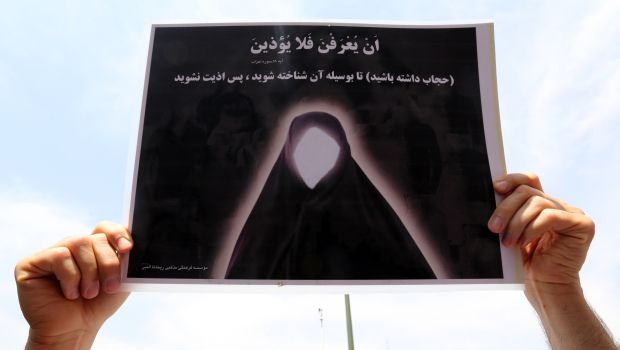The beach or the countryside, a country lane or a main road: the common denominator between them is Iranian women and girls removing their headscarves, raising them in the air joyously and taking photos of themselves to document the fleeting moment before anyone can see them and persecute them.
A deluge of photos has poured onto the “My Stealthy Freedom” Facebook page: images of dozens of Iranian women who decided to post personal photos showing their hair uncovered in the sunshine and fresh air, in open defiance of the dress code imposed on them in public places.
The title of the page includes the words “freedom” and “stealth”—but when freedom needs to be stealthy, it is no longer freedom. This may be exactly what the Iranian women wanted to highlight in their photos.
A common feature in the photos is a smile: a smile of victory, even if it’s a passing, “stealthy” one, as they describe it. It’s the type of thing that can gather momentum, and it did because of that Facebook page.
The phenomenon was launched by Iranian–British journalist Masih Alinejad when she photographed herself walking in London with a smile on her face and the wind blowing through her hair, and then posted it on Facebook.
That photo made many Iranian women feel resentful of their stolen liberty, so they filled the Facebook page with photos that displayed their daring, which the current regime has failed to suppress in the 35 years since it was founded, despite all its attempts.
What is amazing is that all the women posted photos showing their faces, which doubled their defiance of the regime in Iran. Of course, a response came quickly through the official Iranian media, which accused Alinejad of being a conspirator and foreign agent and of planning to corrupt society.
The battle seems to be at an early stage, however, as the number of Iranian women posting on the page grows daily, despite the fact it is less than a month old.
For Iran, this summer’s style of confrontation is new—the country’s morality police has never faced this kind of defiance before. The department tasked by the Iranian regime with monitoring the public’s behavior, launches a campaign every year to apprehend Iranian women who try to use the hot weather as an excuse to bend the rules on the hijab.
Some may see the Facebook page showing Iranian women with their hair uncovered as nothing more than a gesture that has no real significance. That may be true. But the flip side to this page is its direct defiance of one of the strictest rules of the Iranian regime and its attempt to control the lifestyle of its citizens, and especially women.
In my opinion, any political protest faced by the regime is less of a danger to it than the “My Stealthy Freedom” Facebook page.
Here, the pictures strike at what the regime wants to impose on Iranian women as individuals, its own symbol of authority over them. It is an implicit battle between the regime and a virtual, symbolic citizen, someone the regime does not have the tools to stop. What authority is capable of confronting photos of smiling women showing their hair in the fresh air and under the sun?
One photo alone strikes at the heart of the regime much deeper than the words of politicians who criticize its economic, security and foreign policies.
